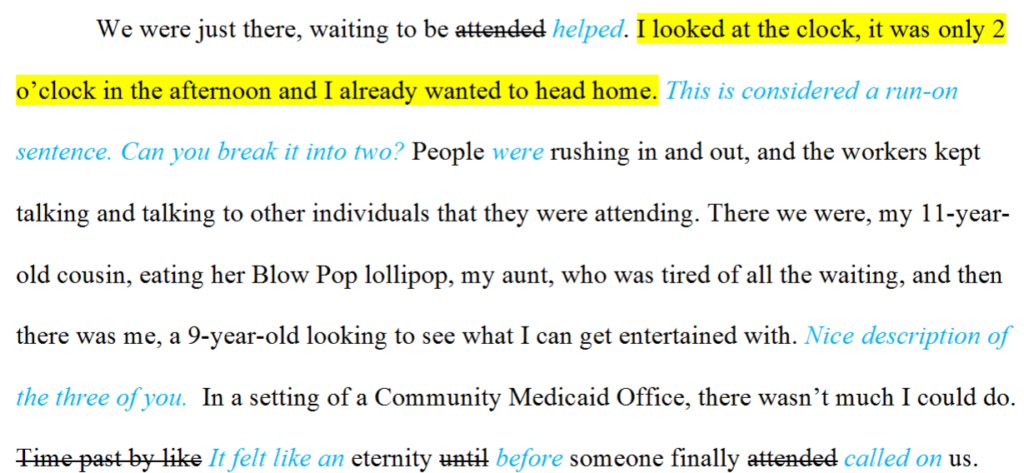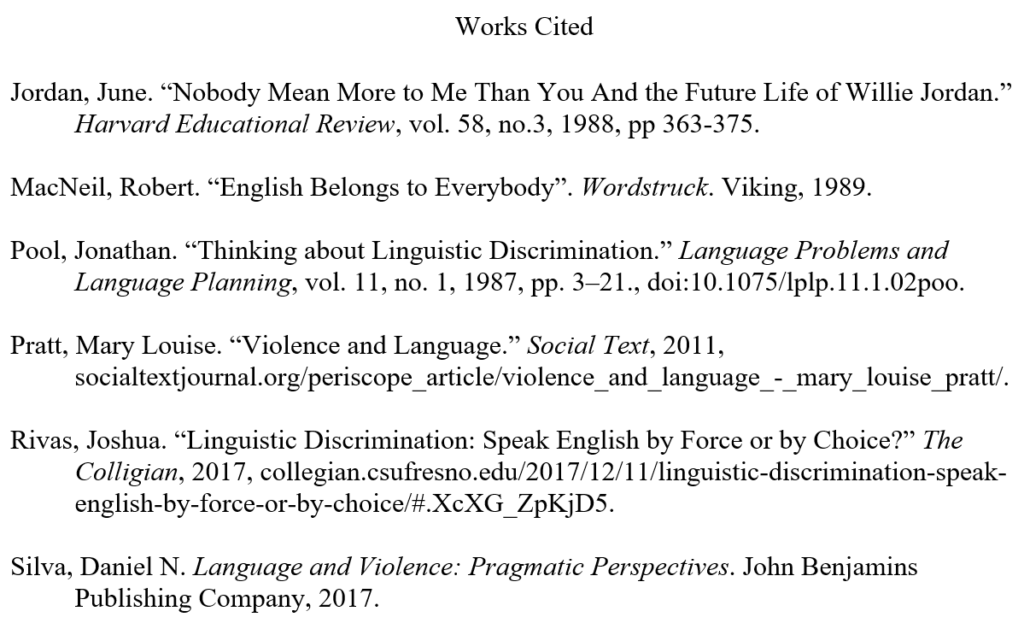In this semester, I took the course FIQWS for Language and Literacy. In this course, I have learned and achieved the course learning outcomes for the both the topic and writing sections. These courses went through 4 total Phases and each of them had major assignments that was done with the help of homework and activities done in class. Phase 1 started off with the reading of Amy Tan’s personal essay of “Mother Tongue” and Lippi-Green’s “Linguistic Facts of Life”. As we approach to Phase 4, the amount of course readings and lectures throughout the course was worth it for the learning outcomes to be achieved.
During Phase 1, the major assignment was the Language and Literacy Narrative. The course outcome that I achieved was “Developing strategies for reading, drafting, revising, and editing”. For reading the strategy that we mostly did was annotating. We were given a course reading for homework and annotated in order for us to look back easily in the text. In the past, I would usually just be given a date for the final paper to be given in, however, drafting, revising and editing has been helpful for me. For our first drafts, we usually have them sent to our instructor and we bring printed copies for peer review. The feedback that I get back, I take into consideration and fix my errors. For example,


The first image was my draft, where my instructor gave some feedback on, then the errors got fixed for my final paper in the second image.
For Phase 2, there was a lot of content covered for the major assignment of the Research Exploratory Essay. One of the course learning outcomes that I achieved was “Locate research sources (including academic journal articles, magazine and newspaper articles) in the library’s databases or archives an on the internet and evaluate them for credibility, accuracy, and bias”. Our first visit to the library taught me how to use CCNY’s library database and how to break down the topic that we are researching on to receive better results. We were also introduced to a data base where we can find primary sources and academic journals which were also used in the essay. Another course learning outcome that I achieved during Phase 2 was “Practice systematic application of citation conventions”. For this major assignment, I had to have a works Cited page because I was using various sources to either support or contradict my argument. I found out that the citations included in our essay, allowed the reader to look back at our sources on their own. For the citations, our instructor taught us how with examples, we had a library session with the librarian, and we even had a citations page in the course booklet for reference.
For example,

Another course learning outcome that I achieved during this Phase was “Recognize and practice key rhetorical terms and strategies when engaged in writing situations”. For the rhetorical situation worksheet, I was always asked to find the reading’s context, purpose, argument, and author. I viewed the reading in a certain point of view in order to achieve this outcome. For my paper, I had to think on who or what type of audience is it addressed to and my claim argument that I wanted to prove.
In Phase 3, I wrote a Critical Analysis Essay and there were some course learning outcomes that came along with that as well. The first course learning outcome that I achieved was “Recognizing the role of language attitudes and standards in empowering, oppressing, and hierarchizing language and their users”. I was given access to the book Language Myths by Bauer and Trudgill. The book contained a myth within each chapter, and we were each assigned a different one and post a summary in Discussions on Blackboard. Lippi Green in “Standard Language Ideology”, also talk about empowering, oppressing and hierarchizing language. In my Phase 3 essay, I chose the example of a white man being racist in a Mexican restaurant, and he felt he was superior because he was talking in English and mistreated the staff and customers (look at Phase 3 essay).In this Phase, I was introduced to CUNY academic commons. I was able to create a platform where I upload my Phase 1 to 3 papers online and create a personal portfolio.
Throughout this semester, I continued to achieve some additional course learning outcomes. One of them was “Exploring and analyzing on my own and other’s writing a variety of genres and rhetorical situations”. Since Phase 1, we have read many genres such as excerpts from books, personal essays, and memoirs. The rhetorical situation worksheet that was given to us to complete, made me understand better why the course readings were written. In Phase 2, the academic journal articles that we had to bring to class made this outcome able for me to achieve. While reading through the journal article that I have chosen for my essay, I kept those questions in mind of “what is the purpose?”, “who is this article addressed to?”, and “what is the author’s audience?” to combine it into the Rhetorical Precis. Another course learning outcome that I achieved was “Develop and engage in the collaborative and social aspects of writing processes”. In this semester, we were asked to make various drafts of our essays in order to do peer review. Personally, it was helpful for me to have another set of eyes to review my work because or else I wouldn’t realize the errors that I was doing and needed to get fixed. During Phase 1 to Phase 3, I have seen many genres that talk about the English language impacting the U.S society. Lastly, the last course learning outcome that I achieved was “Understand and use print and digital technologies to address a range of audiences”. There were many videos such as TED talks and youtube videos that addressed to different audiences such as educational teachers, young adults, and even those who speak a second language. As the semester reaches to its end, I feel that I have made progress as a writer with completing these course learning outcomes


